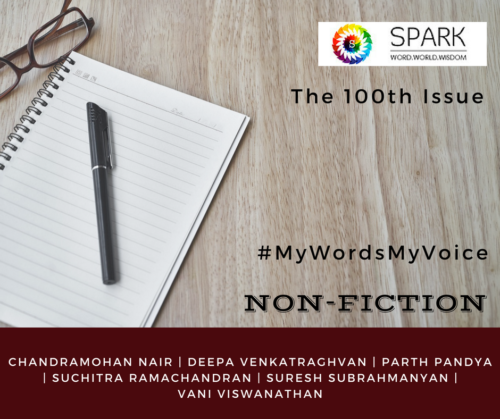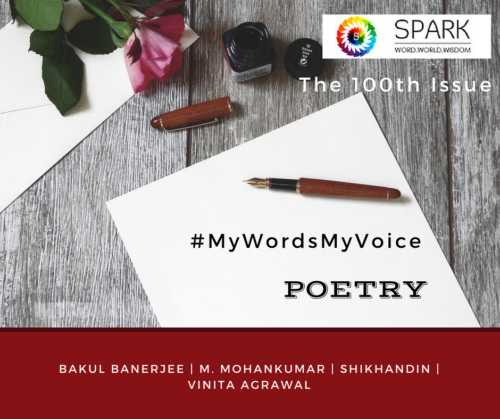Chandramohan Nair: We live in a society where social interaction is increasingly through the mobile phone and social media. Face-to-face interactions have decreased and sensory loads have gone up leading to impersonal relationships and increased stress levels. Paradoxically this had led to an increase in narcissistic traits in some while others suffer from poor self-esteem. In either case the outcome is an unhealthy self-absorption.
Creative writing can help people look at life with a fresh perspective, by making the familiar unfamiliar and vice versa through the process of narrative transportation This results in the reader empathising with the characters in the story and creating vivid imagery in his/her mind as the plot progresses. In essence the reader gets carried away or “transported” by the story and can emerge transformed by the experience. For the writer, apart from the obvious challenge of developing the requisite writing skills to accomplish this transformation, there is also the problem of capturing and retaining the reader’s attention when the distractions are many and the attention span short. Read Chandramohan’s piece here.
Deepa Venkatraghvan: In an era of information overload and in a world where living a fast-paced life is becoming the order of the day, creative writing (and reading) helps one step back, smell the roses. It opens up the senses. Creative writing also helps build patience, discipline and clarity of thought – qualities that are all becoming scant in this hyperactive age where you can binge-watch, swipe left or right or pay with a touch. Read Deepa’s essay here.
Parth Pandya: We are losing our ability to think deep in today’s world. We move from one superficial activity to another, be it checking e-mails at work or sending emojis on WhatsApp. It is easy to pass the day without one insightful thought. Creative writing compels you to produce one. It forces you to sit and think and express and share. In today’s world of messages that are grammatically insufficient and ridiculously short, writing helps bring some depth to our lives. Read Parth’s inspiring call here.
Suchitra Ramachandran: For me, creative writing is always a place to puzzle over, explore, discover and express the truth. It’s a bit of an oxymoron, because when we say creative writing, we mostly think of fiction. But as Tagore said, truth finds facts too tight as a dress, but she moves with ease in fiction. Like a human being pretending to be a statue in a wax museum is immediately apparent to you amidst the uncanny figures around her, when disguised with fictional, poetic and narrative tropes, the truth often jumps out you in a startling way, that is often more vivid than if you would just state the same idea in facts. It is like the child in Ursula Le Guin’s classic short story, ‘The One Who Walks Away From The Omelas’, who, though hidden from plain view, is apparent to just about everyone, even if they choose to ignore her. In today’s world, filled with half-truths and alternative facts and uncomfortably called a ‘post-truth’ world, we need to, more than ever, steel ourselves to search for our personal, uncompromisable truths, and see it in its face. It’s a particularly torturous meditation that I do by writing creatively. Read Suchitra’s essay here.
Suresh Subrahmanyan: In a world where the habit of reading has been under threat for some time now, it is extremely important that people, and youngsters in particular, invest quality time in the art and craft of writing. You could be dealing with a very interesting or important subject, or even a trivial one, but either way unless the writer can present the subject in a manner that grabs the reader’s attention, you don’t stand a chance of being read. In my books, the ‘how’ of writing is as critical as the ‘what’ – unless form and content come together seamlessly, the reader will lose the plot, as it were.
And why is creative writing so critical? Ultimately writing is all about individualism, that unique stamp of your own personality that should permeate every sentence you write. Over time, a creative expression by a writer also helps to garner a loyal and steady readership for the writer. Why do I keep reading P.G. Wodehouse again and again? It’s because nobody else can copy his amazingly standalone style of humour. That is why writers constantly strive to be creative. Above all, read as much as you possibly can. That way lies the true path to creative writing. Read Suresh’s piece here.
Vani Viswanathan: Creative writing sustains us! It gives us hope, escape and pleasure. Creative writing offers a space to explore worlds that are radically different from our own, which could contribute to making the world we live in, better. Personally, creative writing got me to learn new things – reading lived experiences helped me understand feminism better; get over miserable situations – reading fiction makes me laugh, ponder or calm me down; and feel grounded – when I read personal accounts and realise that world over, every individual is doing the best they can in this world that can get tough. Read Vani’s essay here.






